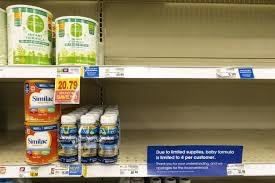 A May 2022 Congressional hearing on the infant formula crisis impelled FDA commissioner Dr. Robert Califf “to fix the problems related to infant formula as well as agency-wide problems with communication and change of command revealed by the crisis.” Issues that emerged following the investigations and hearings included ignoring a whistle-blower complaint, divided and ill-defined responsibility and lack of accountability inherent in the FDA structure. The Agency failed to audit the implicated Abbott and other manufacturing plants on the fragile justification of COVID restraints and did not detected or ignored contamination documented in records.
A May 2022 Congressional hearing on the infant formula crisis impelled FDA commissioner Dr. Robert Califf “to fix the problems related to infant formula as well as agency-wide problems with communication and change of command revealed by the crisis.” Issues that emerged following the investigations and hearings included ignoring a whistle-blower complaint, divided and ill-defined responsibility and lack of accountability inherent in the FDA structure. The Agency failed to audit the implicated Abbott and other manufacturing plants on the fragile justification of COVID restraints and did not detected or ignored contamination documented in records.
 In September the FDA released an update on preventing Cronobacter contamination of powdered infant formula. The circular letter enjoined manufacturers to share safety information and to adhere to higher standards. The FDA has advocated for Cronobacter infection to be designated as a notifiable disease, hired a dedicated group of investigators and has established an Office of Critical Foods.
In September the FDA released an update on preventing Cronobacter contamination of powdered infant formula. The circular letter enjoined manufacturers to share safety information and to adhere to higher standards. The FDA has advocated for Cronobacter infection to be designated as a notifiable disease, hired a dedicated group of investigators and has established an Office of Critical Foods.
During the Federal fiscal year extending from October 1, 2022 through September 30, 2023 the FDA conducted 47 routine annual inspections of foreign and domestic plants producing infant formula. This does not appear adequate given the risks associated with contamination and consequences of interdicting production from any of the large plants that represent the major supply for the U.S. It is noted that livestock processed under the USDA-FSIS and eggs packed for interstate commerce have a constant regulatory presence in plants to ensure compliance with federal regulations and to ensure wholesomeness.

Although progress has been made in centralizing activities for food safety within the FDA the Agency is by structure, tradition and resources committed more to drug safety and medical devices compared to food although their efforts in this regard are sometimes less than effective.
The FDA cannot afford another major food-related crisis since there is considerable groundswell for an independent Federal Food Safety Agency.